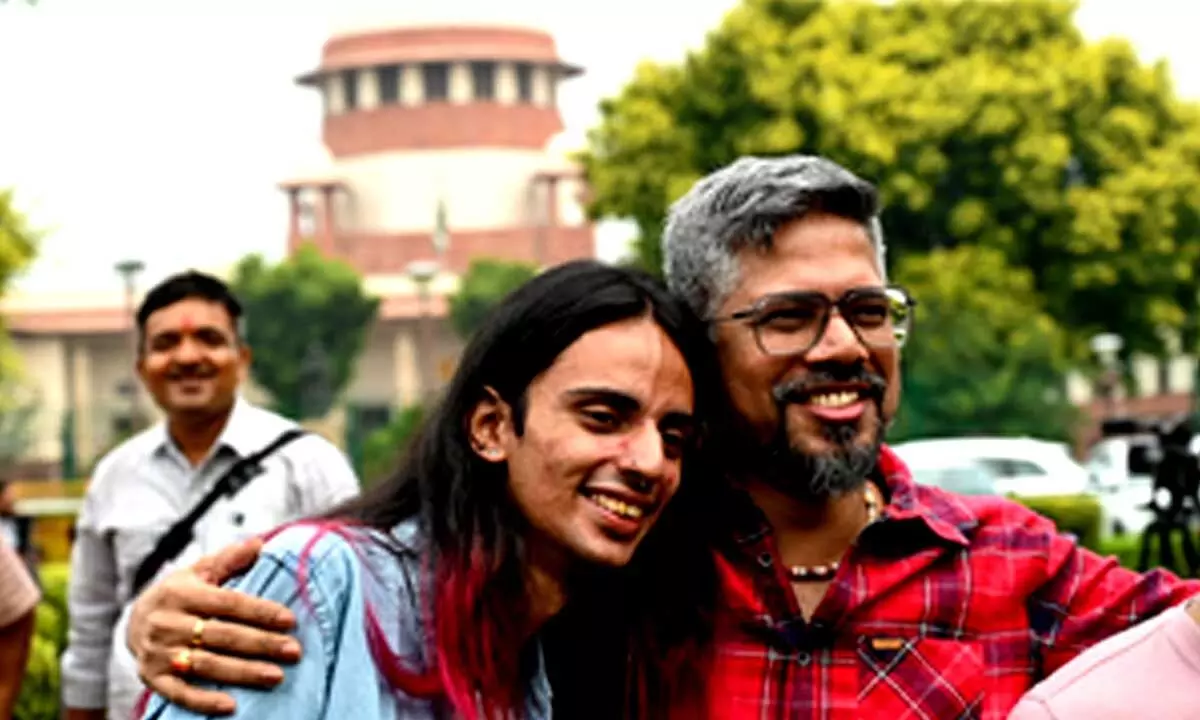Live
- Public Participation Key to Strengthening Democracy-Annamalai
- MLA Anirudh Reddy gets threat letter from Maoist
- "Awareness Program on Road Safety for Auto Drivers Held in Aija Town".
- MLA Bandla Krishna Mohan Reddy Inaugurates NPL Season-4 Cricket Tournament in Netivanipalli
- Rangoli Competitions Showcase Tradition and Creativity in Gadwal.
- "Vadde Obanna: A Revolutionary Hero’s Legacy Celebrated on His 218th Birth Anniversary".
- District Administration Accelerates Implementation of Welfare Schemes.
- Illegal Transportation of Gravel and Soil in Sankalmaddi Village Raises Concerns
- Weavers Celebrate Telangana CM Revanth Reddy’s Welfare Initiatives with Milk Ablution in Aiza.
- MLA Couple Attends Oath-Taking Ceremony of New Governing Body at Shri Shri Jamulamma Parashurama temple in Jammi chedu.
Just In
In 3:2 verdict, Supreme Court refuses to grant any legal sanction to same-sex marriage

A five-judge Constitution Bench, headed by Chief Justice of India D.Y. Chandrachud, on Tuesday refused to grant any legal sanction to same-sex marriage.
New Delhi: A five-judge Constitution Bench, headed by Chief Justice of India D.Y. Chandrachud, on Tuesday refused to grant any legal sanction to same-sex marriage.
The Supreme Court gave decision with a 3:2 majority, holding that a civil union cannot be recognised under the Constitution.
It also asked the Union government to set up a high-powered committee to be chaired by the Cabinet Secretary to take steps to decide the rights and social entitlements of same-sex couples.
The judgment rendered by CJI DY Chandrachud said that the right to marry is not a fundamental right but a construct of the legislature.
In his minority opinion, he held that reading into gender neutral words into Special Marriage Act would amount to judicial legislation and such area should be confined to the legislature.
CJI Chandrachud stressed the right to enter into a civil union flows from the Constitution and the state must take steps to recognise those unions and associations.
He added that choosing a life partner is a fundamental right and homosexual couples cannot be discriminated against.
His opinion held that legislature should not be directed to recognise a homosexual union as a marriage but should ensure that queer people are not discriminated against and are given all the entitlements that are available to other members of the society.
Justice S.K. Kaul agreed with the decision rendered by CJI Chandrachud and said that historically queer couples have a place in society. He held the right to form a civil union flows from the Constitution and opined that there is a need for an anti discrimination law to combat the discrimination against same-sex couples.
Justice S. Ravindra Bhat penned a separate opinion with which Justice Hima Kohli concurred. They held that there is no fundamental right of marriage and the provisions of Special Marriage Act are not discriminatory.
Justice Bhat held that the right of marriage cannot be equated to a fundamental right and is a matter which must be left to the legislature and there exists no positive obligation on the state to recognise a homosexual union.
He said that the various privileges granted by laws to married couples has the effect of discriminating against homosexual couples like in the matter of provident fund, pension fund, etc. and asked the committee chaired by the Cabinet Secretary to look into the rights of same-sex couples.
In his distinct opinion, Justice P.S. Narsimha said that there exists no fundamental right of marriage under the Constitution and there is no unconditional right of marriage. He said that the government is obliged to protect queer relationships but there is no civil union which can be recognised under our law.
The verdict came on a batch of pleas challenging the denial of access to the institution of marriage to the members of the LGBTQIA+ community as being violative of Articles 14, 15, 19 and 21 of the Constitution. It said that the Special Marriage Act, 1954 be interpreted in a manner to include same-sex couples within its ambit and the terms 'husband' and 'wife' can be made gender neutral by using 'spouse', and 'man' and 'woman' should be substituted by 'person'.
Petitioners contended that the state cannot deny marriage to same-sex couples on the ground that traditionally the legal system only recognizes a marital relationship between a man and a woman and right to marry itself is a fundamental right within the scope of Article 21 of the Constitution.
The Union government had opposed the legalisation of same-sex marriage contending that whether or not a particular union is to be recognised as a marriage, is a decision which falls within the legislative domain and is not a matter of judicial interpretation.
Senior advocates Mukul Rohtagi and Maneka Guruswamy, advocate Arundhati Katju, and advocates Tahira Karanjawala, Niharika Karanjawala, Sanya Dua and Shreyas Maheshwarin from Karanjawala & Co., and others appeared for the petitioners. The Attorney General, Solicitor General and others appeared on behalf of other Respondents. Senior advocate Kapil Sibal appeared on behalf of an intervenor.

© 2025 Hyderabad Media House Limited/The Hans India. All rights reserved. Powered by hocalwire.com






